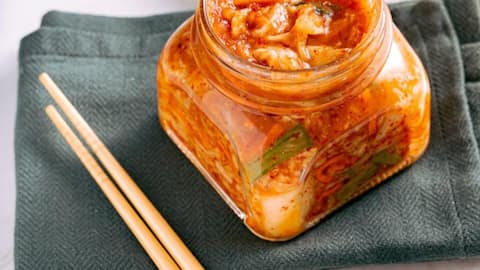Climate crisis hits kimchi: South Korea's iconic dish at risk
What's the story
South Korea's iconic dish, kimchi, is under threat due to climate change. The napa cabbage used in the dish is suffering from declining quality and quantity as a result of rising temperatures, according to farmers, manufacturers, and scientists. Napa cabbage thrives in colder climates below 25 degrees Celsius during summer months and the increasing warmth could potentially halt its cultivation altogether.
Cabbage crisis
Experts express concern over kimchi's future
Plant pathologist and virologist Lee Young-gyu expressed concern over the future of napa cabbage cultivation. Lee mentioned that cabbage prefers growing in a cool climate and adapts to a very narrow range of temperatures. He further explained that the optimal temperatures for cabbage growth are between 18 and 21 degrees Celsius. The rising heat, therefore, poses a significant threat to this staple ingredient in South Korea's beloved kimchi dish.
Crop damage
Rising heat affects quality of kimchi's key ingredient
The warmer climate is already impacting the quality of napa cabbage, a crucial ingredient in kimchi. According to Lee Ha-yeon, a recognized kimchi master by the Agriculture Ministry, the heart of the cabbage "goes bad, and the root becomes mushy" due to rising temperatures. Lee warns that if this trend continues, South Korea might have to abandon making cabbage kimchi during summer months.
Shrinking cultivation
Napa cabbage production halved over two decades
Government data reveals a significant decline in napa cabbage cultivation over the past 20 years. The area of cabbage grown last year was less than half of what it was two decades ago, shrinking from 8,796 hectares to just 3,995 hectares. Researchers attribute this decrease to higher temperatures, unpredictable heavy rains and pests that make summer cultivation increasingly challenging.
Import impact
Climate change and imports challenge kimchi industry
South Korea's kimchi industry is grappling with the dual challenges of climate change and lower-priced imports from China. The government has proposed climate-controlled storage to manage price fluctuations and supply shortages. Customs data shows a 6.9% increase in kimchi imports, amounting to $98.5 million (₹808 crore approx.) this year, with China being the primary source, marking the highest ever for this period.
Future fears
Scientists and farmers seek solutions amid climate crisis
Scientists are striving to develop crop varieties that can withstand warmer climates, unpredictable rain, and infections. However, farmers like Kim Si-gap, who has spent his life working in the cabbage fields of Gangneung's eastern region, fear these new varieties will be more expensive to grow and may not taste the same. Kim expressed that it was both shocking and saddening to read reports predicting a future in Korea where cabbage could no longer be grown.
